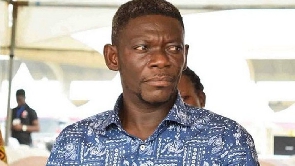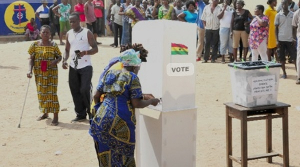- Home - News
- TWI News | TV
- Polls
- Year In Review
- News Archive
- Crime & Punishment
- Politics
- Regional
- Editorial
- Health
- Ghanaians Abroad
- Tabloid
- Africa
- Religion
- Election 2020
- Coronavirus
- News Videos | TV
- Photo Archives
- News Headlines
- Press Release
Business News of Saturday, 25 January 2014
Source: GNA
Extravagant funerals in U/E; bane of food insecurity
Extravagant funeral performances by some people in the Upper East Region have been identified as a major factor militating against food security and nutrition in the area.
This came to light when Rural Initiatives for Self-Empowerment-Ghana (RISE-Ghana), a Non-Governmental Organisation with funding from World Vision Ghana, an international NGO, organised advocacy programmes through dramas at separate functions in the Talensi district, to sensitize the Kpangour-Yamsouk, Sheaga, Kaare and Sawalga communities about the negative effects of expensive funerals.
Speaking on the topic” Challenges posed by Expensive Funerals and its Effects on Society”, the Talensi District Director of the National Commission for Civic Education (NCCE), Mr John Akaribo, indicated that apart from the phenomenon causing food insecurity in the area, it had serious negative consequences on children’s education, health, family income, and moral behaviours.
“You will all agree with me that most children’s education and health have been sacrificed for expensive funerals, which have assumed priority in our homes. We consider buying expensive funeral cloths to the detriment of our children’s school uniforms”, the NCCE Director stressed.
He mentioned some of the items used in performing funerals in the area as malt (for brewing pito), rice, millet, beans and “bambara beans”.
Others are cows, goats, sheep, alcoholic drinks, groundnuts, guinea fowls and fowls, as well as the hiring of drummers and spinners and purchasing of funeral cloths, among others.
Mr Akaribo said, considering the poverty level in the area coupled with the erratic rainfall patterns in the region, which affect crop production, there is the need to reduce the quantum of resources used in performing funerals, and rather cater for family needs.
He indicated that unlike the southern parts of the country where sympathizers contribute in cash and kind to support bereaved families to perform their funerals; it is not so in the region, and called for a stakeholder forum, involving traditional rulers, opinion leaders and other concerned citizens, to deliberate on how to curtail extravagance and profitless funerals in the area.
Ms Dziedzorm Awudu, Development Facilitator of WVG, indicated that her outfit was much particular about the welfare and well-being of children, and said during one of its review programmes, it was realized that the phenomenon was a major issue which needed to be tackled.
She said the decision led to the re-designing of its programmes, targeting stakeholders to see how the matter could be addressed.
The Project Manger of RISE-Ghana, Mr Awal Ahmed, indicated that apart from staging the drama, his outfit as a civil society organisation, would work towards engaging with other stakeholders to deal with the problem.
He reiterated the need for the communities to take the advocacy issues on funerals seriously, to improve upon their conditions.











